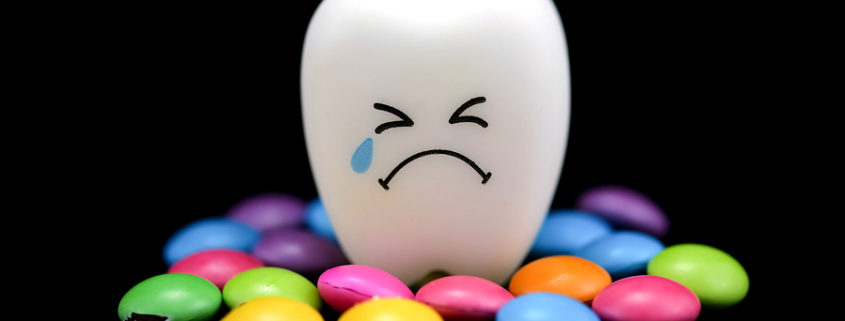Why is sugar bad for your teeth?
Yeah yeah, we know sugar is bad for our teeth. Mom said it, dad said it, Mrs. Haverman in the first grade said it. Sugar’s role as our mouth’s archnemesis is not new information, but have you ever stopped to consider WHY it’s so bad for you? Well, we’re here to tell you that unfortunately, the adults in your life didn’t make up the horror stories just to keep you away from the joy of a Snickers bar. There’s really some annoying science behind it…
First of all, we should note that it’s not really the sugar’s fault, it’s the reaction the sugar triggers in your mouth. According to the National Institute of Dental and Craniofacial Research (and probably any other person with a scientific background) your mouth is home to a host of bacteria – some good and some bad. They’re a part of the environment of your body, but sometimes what we put into our bodies disturbs the equilibrium of our natural ecosystem.
When you eat sugar, some of the bad bacteria in your mouth recognize a new food supply. They pig out on the molecules left on the surface of your teeth from your last lollipop or cookie, and when they do, they produce an acid that can destroy the tooth enamel. The acid does this by dissolving minerals on the surface of your teeth. While saliva helps to replenish these minerals (such as calcium, phosphate, and fluoride), they can’t do their repair work fast enough if you are consuming one sugary substance after another.
Eating too much sugar and not giving the repair process time can create cavities which work from the outside in. They begin on the tooth’s surface and slowly eat through the dentin (soft layer under your enamel) until they reach the pulp of the tooth where your blood vessels and nerves are stored.
Result? Discomfort, pain, and a trip to the dentist.
The good news is that there are some pretty simple ways to prevent this nasty sugar situation from occurring:
- Keep the saliva flowing
- Chew sugarless gum
- Drink water
- Eat high fiber fruits and veggies
- Eat foods with tooth-strengthening properties
- Cheese, yogurt, and dairy (contain phosphates)
- Green and black tea (suppress oral bacteria)
- Use toothpaste with fluoride
- Avoid excessive sugar consumption
Though sugar is not the only culprit when it comes to cavity development, it is a troublemaker. Take care to brush, floss, and consume foods that will limit potential damage to your pearly whites.



